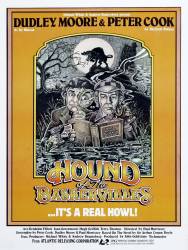Mrs. Ada Holmes: Pesticide, my own son guilty of pesticide.
Sherlock Holmes: It's patricide, mother.
Sherlock Holmes: Do you think I'm gonna waste my time combing the streets of London for some old boot? This is a job for an imbecile.
Doctor Watson: Quite right, Holmes, let me deal with this.
Doctor Watson: Where and at what time does the train leave for Baskerville?
Dr. Mortimer: Tomorrow, 12 o'clock, Victoria.
Doctor Watson: Oh no, you can call me John.
Sir Henry Baskerville: All the Baskervilles have hearty dicks... dicky hearts, I mean.






Answer: The actors would have no control over whether a film should continue production, particularly just because they didn't like how it was progressing. They were under contract and paid to act in a movie, regardless of the quality and would be sued if they quit. Movies are financed by studios and investors who expect a monetary return on their investment. Even if the film's quality was considered poor, producers would base their decisions on making a profit or at least recouping the costs. Halting production would be an extreme last resort.
raywest
Thank you for your informative and interesting points. I read a biography of Peter Cook which said that when the film studio executives saw the finished film they realised it just was not funny or entertaining. There was reluctance to give it a cinema release, as it was thought it would not even recoup distribution costs. It was eventually given a limited release and it bombed. I saw the film once on television, even though I am a fan of many members of the cast, I was wholly unimpressed. I think most of the cast, too, were embarrassed by the film.
Rob Halliday